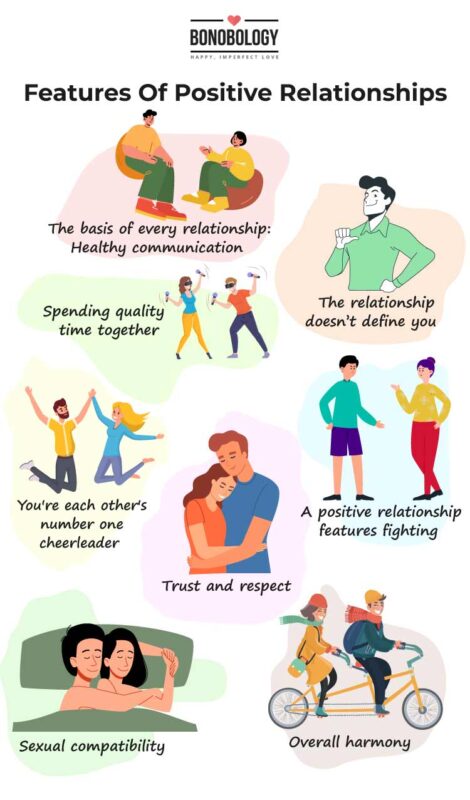Sure, your dynamic may currently feel like it’s the most positive relationship you’ve ever been in, but didn’t your high-school relationship feel the same when you were in it? That one probably didn’t turn out quite the way you’d hoped it would. The truth is, you can’t really be sure you’re in a positive relationship unless you look at the signs and the benefits of one.
Can you really call yours a positive relationship just because your partner got you dessert without you asking for it? While that does signify a weirdly cosmic connection, perhaps it doesn’t completely fit the bill of what we’re talking about today.
Be it with a friend or lover, family or colleagues, let’s figure out what it takes for a relationship to be considered a healthy connection. With the help of counseling psychologist Gopa Khan (Masters in Counseling Psychology, M.Ed.), who specializes in marriage and family counseling, we uncover the psychology, signs and benefits of a healthy dynamic.
How Do You Build Positive Relationships?
Table of Contents
In the movies, we are used to seeing two immaculately gorgeous people bumping into each other on a busy street and suddenly, the most significant positive relationship comes into existence against a soundscape of orchestral music.
As you probably already know, it’s a little different IRL. “For a successful and positive relationship to exist and thrive, there must be an enduring commitment to getting through the good and the bad together,” says Gopa.
“You must have positive thoughts about your partner in your heart and in your head. In the case of romantic equations, an effort must be made to share lives cooperatively. In a healthy dynamic, you acknowledge that this person comes before others, but doesn’t make the other people in your life, like your parents, feel as though they’ve lost you.
“To build a strong and lasting connection, you must spend quality time together, focus on each other and cultivate the connection. Perhaps the most important thing is that you validate your partner, listen without interrupting, and that you accept and acknowledge how they feel,” she adds.
As Gopa points out, making a person feel heard is all it takes to be able to form a deep and lasting connection with them. Whether that proves we’re all desperate for intimacy or it proves how easy it is to surround yourself with tranquility, we’ll take it.
Now that you know a bit about building positive relationships, let’s talk about the signs you’re in one. Lest you let a perfectly good bond slip past you. Who’s going to get you dessert then?
Related Reading: 15 Characteristics Of A Healthy Relationship
Positive Relationship And Psychology
In general, the psychology behind relationships is that there are two or more people, as in a friendship, family, marriage, romantic relationship, etc, where the participants have a degree of influence over one another. This is the basic definition of a relationship from a psychological perspective.
If we just add the term positive to the equation, the influence becomes positive too. It is that simple. A relationship where the participants have a positive impact on each other is a positive relationship. This simple addition can have a manifold effect on the relationship. It is like fuel to rocket ships, the more you have the higher you can go.
Positive Relationship Examples
We are sure you must’ve come across couples who seem to have figured it out. They seem to have a bond that is stronger than most couples. You are not sure what that x-factor is, but you still feel its existence. It is innate positivity that fuels these couples.
Such couples are portrayed in cinema all the time. Even though exaggeration is a part of the drama, we can always take away key points. Take Chandler and Monica from the classic sitcom, FRIENDS. The positivity is what leaves the audience in awe. The way they handle conflicts, and the way they exhibit compatibility and teamwork are all worth learning from. Again, we’d not suggest you follow them word for word but look for the key takeaways.
Another brilliant example that comes to mind is the duo of Gus and Hazel in The Fault in our Stars. In the thick of hardships, they showcase what an impact positivity can have. It is the purity of love that leaves the audience in tears (no shame, we were all left in tears).
Features Of Positive Relationships
Michelle and Barack, Jack and Rose, Netflix and you (sorry), they all have to be positive relationships, right? You can’t really say for sure unless they have all the signs of being one. The next time that obnoxious couple you know flaunts their bond, at least you’ll be able to tell if there’s any truth to their exuberant claims.
“Whether the couple is overall satisfied or not will govern whether it is a healthy bond or not,” says Gopa. Let’s take a look at what it means to be in a satisfying relationship.
1. The basis of every relationship: Healthy communication
Can you and your partner talk about anything and everything under the sun? Can you tell them you don’t like the way they laugh without inciting a fight? Can you tell them you hate the shows they’re into? Or do you prefer keeping it to yourself, slowly accepting your fate of watching the worst shows known to mankind?
How two people communicate with each other largely defines the kind of dynamic they have. “Simply put, positive communication is the key to any bond. Marriages break up if there is a lack of communication, or if healthy communication is nowhere to be found,” says Gopa.
2. The relationship doesn’t define you
Meaning, that there’s plenty of personal space in your dynamic and that allows you to retain your individuality. When you maintain your own personality, you’ll constantly be bringing something new to the table.
“Are the people involved co-dependent or independent? Giving each other space and not suffocating themselves and the relationship is what will help them grow in the long run,” says Gopa.
Nisha and Howard have an understanding that every third Friday, they’ll spend a day apart. They call it the me-day. They are free to spend the day any way they want without thinking about their partner’s judgments. And later that weekend they’d talk about their me-day, what they did and how it made them feel. This exercise has helped them maintain and understand their respective individuality. They’ve been married seven years now and they are as happy as any married couple can be.

3. Spending quality time together
But wait, we just listed out the importance of independence! So, which one is it? Both, of course. For any bond to be able to thrive, you must find the sweet spot between personal space and spending quality time together – sans phones.
“One of the best ways of building positive relationships is by spending quality time together. I had the case of a newly married couple recently, where the husband wanted to act like a bachelor, expecting the wife to be a silent partner. Initially, the wife begged him to spend some alone time with her, but she eventually decided to walk out of the marriage,” says Gopa
Spending quality time together is a fundamental part of any relationship. If you feel alone in a relationship, it’s better not to be in one.
Related Reading: Healthy Family Dynamics – Understanding The Types And Roles
4. A positive relationship features fighting
And lots of it. The only difference is that the fights don’t look like what you expect them to look like. There’s no broken furniture, no broken silverware, voices aren’t raised (for the most part) and there’s always a conclusion reached.
We get it. We’re all humans here (except Ryan Gosling, we can all unanimously agree he’s a God). We all fight dirty. To get your point across, you’re bound to raise your voice on some occasion or the other. It happens.
In a healthy relationship, however, what’s important is that the conflict resolution techniques deployed are often a lot more effective at undoing any damage a few harsh words might’ve done. So the next time the “perfect” couple says they never fight, you know they’re full of it.
5. Trust and respect
“Another key sign is the presence of mutual trust and mutual respect. They are the basic pillars of any bond. Just loving a partner without trust and respect does not bode well for the future,” says Gopa.
It’s basically as simple as that. Love without either trust or respect is never going to last. Think about it. If your partner doesn’t care much for your opinion or is tracking your every move, how will it ever become a significant, positive relationship?
Martha is a social animal while her partner Angela is a classic introvert. Talk about opposites attract. Martha was an extremely attractive bi-sexual woman who had friends in literally every part of the city. They had recently started dating and the conflicts began to bubble up. Angela couldn’t cope with her insecurities and began to question Martha’s every step. Martha too couldn’t respect Angela’s insecurities enough to have a genuine conversation about it. But they lived happily ever after. Of course not!
6. Sexual compatibility
“Sex definitely deepens a bond and brings people closer. Relationships that lack sex or affection, in the long run, can have negative effects on the dynamic as it reduces the overall satisfaction of being a couple. Such bonds are at risk of breaking up if one partner starts to feel rejected,” says Gopa.
Of course, if yours is a platonic or an asexual relationship, this doesn’t apply to you. For the affiliations that do feature sex, however, it invariably becomes an important aspect of it.
The next time someone asks you, “What is a positive relationship?”, just say it’s one where both partners finish together, and not where one sprints to the finish line and then lays down breathless for 10 minutes.
7. You’re each other’s number one cheerleader
“Are you each other’s support systems? Do you rely on each other? If stranded, can you depend on each other to come to your aid? Support, in every shape and form, is extremely important,” says Gopa.
Gopa explains how support for married couples can translate into parenting as well. “Since both partners come from different parenting backgrounds, it is important to focus on being a parenting team qnd being supportive. Parenting issues like allowing in-laws to interfere usually cause a lot of animosity between couples.”
The cornerstone of any healthy bond is supporting each other, and how much each partner can rely on the other. If your partner is not the first person you call when things go wrong, then something ‘s not right.
Related Reading: Healthy vs. Unhealthy Relationships – 10 Characteristics
8. Overall harmony
Positive relationship psychology focuses on enriching your life and makes you feel more satisfied than you did before you experienced it. “Things like work, financial issues and sharing responsibilities can all impact the relationship,” says Gopa.
“The majority of a couple’s fights revolve around financial issues. When they’re capable of having a healthy discussion around finances, it’ll definitely increase the overall satisfaction. Sharing responsibilities, indicating care and empathy towards each other also go a long way…”
“The last 2 years of the pandemic have shown us that spouses’ not helping out at home is a major problem couples have. When there’s support and shared responsibility, those fights are often avoided,” says Gopa.

Benefits Of A Positive Relationship
“Having a healthy marriage creates a strong support system against the lemons life throws at you. It provides a stable foundation for children to grow up in, developing and learning good values,” says Gopa.
“Of course, it can also boost your personal happiness and satisfaction. There’s a direct correlation between having a healthy bond with someone and your mental health. It can act as a buffer toward loneliness and isolation,” she adds.
Though you may come across a lot of different positive and negative relationships in your life, the advantages of being involved in a good one, are unparalleled. Hopefully, with the help of the signs we listed out, you’ll better be able to distinguish between the truly fulfilling dynamics and the ones that come under the guise of infatuation.
How To Nourish Positive Relationships?
No matter how solid the base is, all buildings require regular maintenance. Since we talked about cinema, we figured we’ll add some symbolism of our own and it fits. Positivity in a relationship is about making a consistent effort. If you are not prepared to continuously invest in your relationship, what the hell are you doing anyway?
Relationships fade out if they are not nourished. You need to feed it a regular dose of love, attention and time. If you think about the beginning of your relationship, the honeymoon phase, remember how much effort you used to put in? It’s about having the same zeal to nourish the relationship. The actions can vary, but the intention needs to be to sweep your partner off their feet every single day.
FAQs
As our experts point out, you must spend quality time with a person to be able to build a positive relationship with them. You should also have unadulterated positive emotions towards this person.
The presence of the fundamentals of any good bond, like healthy communication, mutual trust and respect, personal space and quality time, all make a relationship positive. Once your bond with a person allows you to become the best version of yourself, you can be sure that the bond has a beneficial influence on your life.
Any relationship that allows a person to feel independent, satisfied and fulfilled both emotionally and physically is an example of a positive relationship.
Since they help boost personal satisfaction, happiness and growth, such relationships are important for everyone to have in their lives. They can also help prevent negative emotions like loneliness and depression.
Ask Our Expert
You must be Logged in to ask a question.


